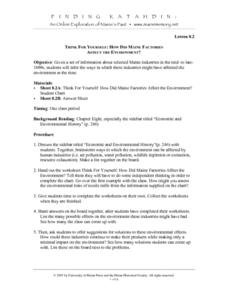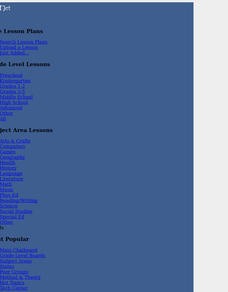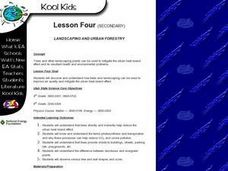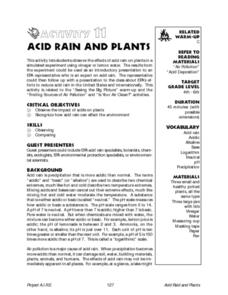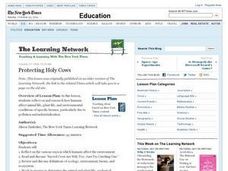Curated OER
Particulate Matter: How Dirty is the Air We Breathe?
Fourth graders create a simple testing device and collect and observe the pollution in the air we breathe.
Curated OER
How Did Maine Factories Affect The Environment
Students investigate the history of interactions with the environment in the 1800s. They conduct research looking for possible negative influences upon the environment. The information is used to conduct a class discussion about the...
Curated OER
A Breath of Fresh Air! Oxygen Tolerance in Bacteria
Students explore and research what pork and beans, gangrene and denitrification have in common. They summarize that they all are the result of anaerobic bacterial action. Students analyze the chemical processes that are carried out by...
Curated OER
Coal and the Environment
Students read about how burning coal affects the environment. After students finish reading about how burning coal affects the environment they have a group discussion to discuss what they thought about the information.
Curated OER
Temperature in the Sun or Shade of the Desert
Third graders use thermometers to measure the air temperature in several
places around the school and then return to the classroom to record the data. They create a bar graph and discuss their findings about the air temperature in the...
Curated OER
The Awful 8: The Play
Young scholars perform a play based on pollution. In this pollution science lesson, students perform a play about different pollutants and how it effects our daily lives.
Curated OER
Dig Into Ireland
Students explore environments and wildlife of Ireland to find out how they were formed, and how they helped form Irish culture. Students research online to determine connections between present elements in Irish culture and wildlife and...
Curated OER
Climate And the Greenhouse Effect
Students demonstrate the greenhouse effect. They recognize that relatively small changes to our environment can stimulate significant climate changes. They determine that the "scientific method" is a process of testing hypotheses and...
Curated OER
Pollution
First graders identify and discuss different kinds and sources of of pollution. They explain why it is important to keep the environment free of pollution. They make a poster depicting the dangers of pollution and make litter boxes.
Curated OER
Landscaping and Urban Forestry - Lesson 4 (Grades 5-6)
Students discuss reasons to plant trees and the best locations for cooling. They analyze two homes identifying types and locations of trees, and location of the central air conditioners. The benefits of shade, the process of...
Curated OER
Landscaping And Urban Forestry - Lesson 4 (Grades 8-9)
Students discuss reasons to plant trees and the best locations for cooling. They study two homes and identify types and locations of trees and determine the placement of the central air conditioners. The class plans a landscape design...
Curated OER
Acid Rain
Students investigate acid rain. In this environmental lesson, students participate in an experiment using litmus paper and various liquids and then test the acidity of the liquids. Students identify reasons why acid is harmful to the...
Curated OER
Water, Water Everywhere (Pond Animals)
Second graders examine the characteristics of animals who live in a pond environment. In groups, they describe the various stages in the life of a frog and identify the characteristics of other pond animals. Using this information,...
Curated OER
Keeping our Water Clean
Second graders discuss how our actions impact the quality of water. In this environmental science instructional activity, 2nd graders watch a short film and discuss the problem of polluted water. Students are then divided into groups and...
Curated OER
My Life As An Insect In Namib
Students examine the harsh living environment of the Namib Desert. They watch and discuss a video, record the types of insects observed in the video, record information about insects and animal adaptations in their science journals, and...
Curated OER
I See a Coyote
Students role-play coyotes looking for natural resources. In this natural resources lesson, students examine the relationship between animal life and the environment. Students play a game that demonstrates how natural resources affect...
Curated OER
Pond Life
Students explore pond ecosystems. In this living environment lesson, students observe the local pond and identify the living things they find by drawing pictures. Students observe organisms that were found in the pond by using a...
Curated OER
So You Want To Travel To Namib
Students research and plan a trip to the Namibian desert. They watch and discuss a video, develop a list of the harsh conditions while viewing the film, identify the precautions needed for traveling in the Namib environment, and write...
Curated OER
Acid Rain And Plants
Students observe the effects of acid rain on plants. They simulate an experiment using vinegar or lemon water. They observe the impact of acids on plants and recognize how acid rain can affect the environment. They examine their plants...
Curated OER
Life in a Drop of Pond Water
Young scholars investigate living creatures that inhabit a pond and explore how various organisms satisfy their needs within their environments. In this life in a drop of pond water lesson, students examine microorganisms under...
Curated OER
Water Cycle (Grades 2-4)
Students demonstrate their understanding of the water cycle and how it effects the environment by graphically depicting and describing the water cycle.
Curated OER
Protecting Holy Cows
Students study the interrelationships of organisms and their environments. They study ecological communities and determine what is necessary for survival. Students discuss and answer questions concerning a group's biome, habitat, food...
Curated OER
The MPA “GamePlan”
Eighth graders explore the purpose of having Marine Protected Areas. In this environmental science lesson plan, 8th graders simulate the planning process by playing a board game. They explain the positive and negative effects of trade offs.
Curated OER
Nutrition: It's In Your Hands
Fourth graders use this lesson to focus on their health, nutrition and the state of the environment. In groups, they examine the various types of land, water and air pollutants and compare and contrast a food chain with and without a...



